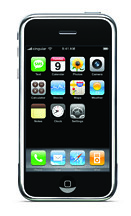With Cisco now suing Apple over use of the name "iPhone," something I intend to dig deeper into on Tuesday, the terminology might get a little muddled, given that people in the communication and advertising industry often use pertinent terms interchangeably without meaning to (myself included). Here's a quick term primer that might help keep it straight:
1. A brand refers to the general impression of a person, place, or company (total global awareness of the brand, along with the net sum of positive and negative impressions).
2. A logo is the design and/or name that represents the brand.
3. A trademark is a logo and/or name that has been registered with the United States Patent and Trademark Office or other government trademark offices.
4. A mark is the design element of the logo, apart from the name (eg. the Nike swoosh).
5. An identity is the presentation of company's communication material, which usually includes the logo (eg. an identity package).
This may be helpful in the months ahead as Cisco and Apple spend millions of dollars in a high-stakes legal battle over the "iPhone" trademark. However, if it gets equally ugly outside of the courtroom, the trademark may cause both companies "brand" damage.

















